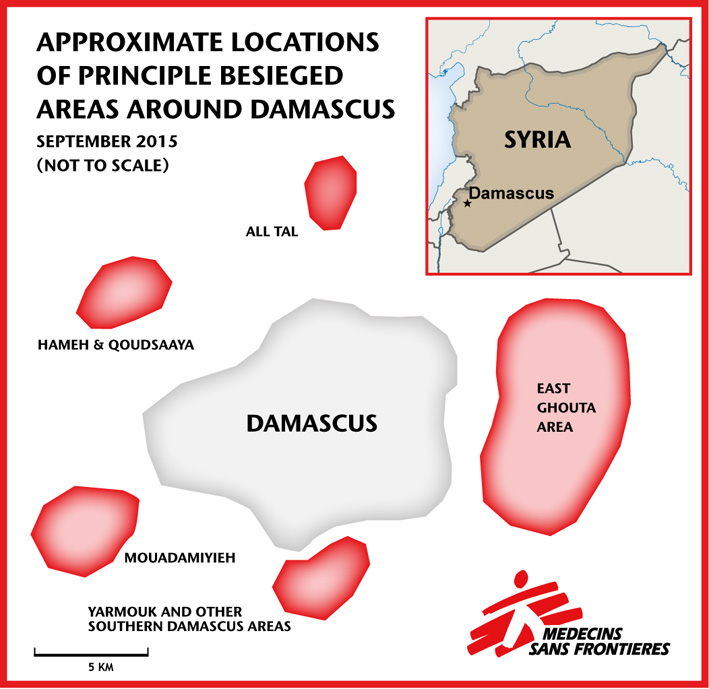
BRUSSELS/NEW YORK—Heavy bombing of markets and civilian buildings in East Ghouta overwhelmed makeshift hospitals supported by the international medical humanitarian organization Doctors Without Borders/Médecins Sans Frontières (MSF) in August, making it one of the most violent months yet in this besieged Syrian community near the capital Damascus, MSF said today.
Medical personnel at 13 MSF-supported makeshift hospitals treated at least 150 cases of violent trauma per day in East Ghouta from August 12 to 31, including many children. Other areas north of Damascus are also being denied medical supplies, food, fuel and other essential goods, bringing the number of people living in besieged areas of Syria to approximately two million, MSF said.
"This is one of the bloodiest months since the horrific chemical weapons attack in August 2013," said Dr. Bart Janssens, MSF director of operations. "The hospitals we support are makeshift structures, where getting medicine is a dangerous and challenging endeavor, and it is unthinkable that they would have been able to cope with such intense emergency traumas under such constraints. The Syrian doctors' continued unswerving effort to save lives in these circumstances is deeply inspiring, but the situation that has led to this is totally outrageous."
The data for the mass casualty influxes at six of the 13 MSF-supported hospitals in East Ghouta reveal 377 deaths and 1,932 wounded patients in August. Among them, 104 of the dead and 546 of the wounded were children younger than 15. The intensity of the bombings temporarily cut some communication channels, but based on initial reports from other MSF-supported facilities, it is clear that at least 150 war-wounded patients were treated per day from August 12 to 31.
At the same time, the sieges around Damascus have both tightened and expanded.
Three areas to the north of Damascus with at least 600,000 people—All Tall, Hameh and Qoudsaaya—have been under siege since July 22. People are stopped and searched and prevented from bringing in any food or supplies.
Even more severe siege tactics have been tightened on areas such as Mouadamiyieh, blocking not only medical items and food, but all pedestrian traffic. Medical evacuations are now impossible from most besieged areas, even for patients who urgently need advanced life-saving treatment.
"The stranglehold of siege means these communities are being deprived of the basic goods that are essential to their survival," said Dr. Janssens. "We are aware of around 400 amputations conducted in East Ghouta in August. Many of these people's limbs could have probably been saved if the medical care in besieged areas were not so desperately constrained. Via the medical networks we are still able to get medical supplies through the siege lines, but it is becoming increasingly difficult."
MSF is urgently organizing the resupply of essential medical items to replenish exhausted pharmacy stocks, including more than 5,000 intravenous fluid pouches and 1,500 pouches of blood.
MSF in Syria
MSF operates six medical facilities in the north of Syria and directly supports more than 100 health posts and field hospitals throughout the country, with a particular focus on the besieged areas. These are mostly makeshift facilities with no MSF staff present, where MSF provides both material support and distance training support to help the Syrian medics cope with the extreme medical needs. This support network has been built up over the past four years.




